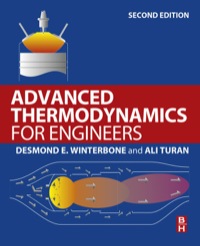A thermal conductor of constant cross-sectional area connects two reservoirs which are both maintained at the same
Question:
A thermal conductor of constant cross-sectional area connects two reservoirs which are both maintained at the same temperature, \(T_{0}\). An electric current is passed through the conductor, and heats it due to Joulean heating and the Thomson effect. Show that if the thermal and electrical conductivities, \(k\) and \(\lambda\), and the Thomson coefficient, \(\sigma\), are constant the temperature in the conductor is given by
\[T-T_{0}=\frac{J_{\mathrm{I}} k}{\lambda \sigma L}\left(\frac{x}{L}\right)-\frac{J_{\mathrm{I}} k}{\lambda \sigma L\left(\mathrm{e}^{\frac{J_{\mathrm{I}} \sigma L}{k}}-1\right)}\left(\mathrm{e}^{\frac{J_{\mathrm{I}} \sigma L}{k}\left(\frac{x}{L}\right)}-1\right)\]
Show that the maximum temperature is acheved at a distance
\[\left(\frac{x}{L}\right)=\frac{k}{J_{\mathrm{I}} \sigma L} \ln \left\{\frac{k\left(\mathrm{e}^{\frac{J_{\mathrm{I}} \sigma L}{k}}-1\right)}{J_{\mathrm{I}} \sigma L}\right\}\]
Evaluate where the maximum temperature will occur if \(\frac{J_{1} \sigma L}{k}=1\), and explain why it is not in the centre of the bar. Show that the maximum temperature achieved by Joulean heating alone is in the centre of the conductor.
\([x / \mathrm{L}=0.541]\).
Step by Step Answer:

Advanced Thermodynamics For Engineers
ISBN: 9780080999838
2nd Edition
Authors: D. E. Winterbone, Ali Turan





